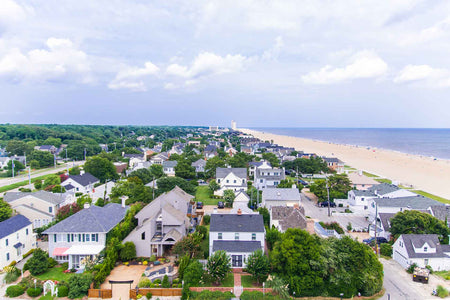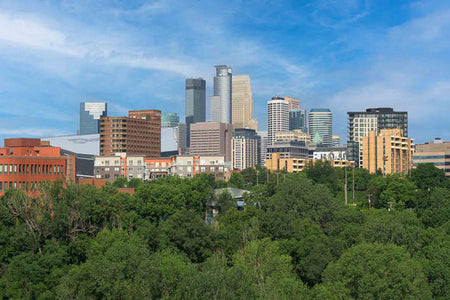Living in Louisiana can be a wonderful experience with its rich culture, delicious cuisine, and vibrant music scene. However, for many residents, the state's unique environment can also bring about challenges when it comes to allergies. Understanding Louisiana allergies is crucial for managing symptoms and improving quality of life.
Louisiana's warm and humid climate can contribute to a variety of allergies that residents may experience throughout the year. From pollen in the spring to mold in the wetter months, staying informed about common allergens in the region is key to finding relief. Many people in Louisiana may also be sensitive to dust mites, pet dander, and certain types of grasses that thrive in the state's fertile soil.
For those navigating allergies in Louisiana, seeking advice from healthcare professionals, such as allergists or immunologists, can provide personalized strategies for managing symptoms. Simple steps like keeping indoor spaces clean, using air purifiers, and staying indoors during peak pollen times can make a significant difference in reducing exposure to allergens.
By being proactive and informed about Louisiana allergies, residents can continue to enjoy all the wonderful aspects of living in this vibrant state while keeping allergy symptoms at bay. Remember, with the right knowledge and care, managing allergies in Louisiana can be a manageable part of daily life.
Louisiana Allergy Seasons
Understanding the patterns of allergens throughout the year can help you better manage your allergies.
Spring: Pollen Galore
Spring in Louisiana is notorious for high pollen levels. Trees, grasses, and weeds release pollen into the air, causing allergic reactions in many people. Common symptoms include sneezing, runny nose, and itchy eyes. It's essential to stay indoors on high pollen days and use air purifiers to reduce exposure.
Summer: Mold and Dust Mites
As the weather warms up, mold spores become more prevalent in Louisiana. Additionally, dust mites thrive in humid environments, leading to increased allergy symptoms. Keeping indoor spaces clean and dry can help reduce exposure to these allergens.
Related: Summer Allergies Guide
Fall: Ragweed Season
Ragweed is a common allergen in the fall in Louisiana. This plant releases pollen into the air, triggering allergic reactions in many individuals. Symptoms can be similar to those experienced in the spring. Avoiding outdoor activities on high pollen days and using antihistamines can help manage symptoms.
Related: Fall Allergies Guide
Winter: Indoor Allergens
During the winter months, people tend to spend more time indoors, where allergens like pet dander, dust mites, and mold can trigger allergies. Keeping indoor spaces clean, using allergen-proof bedding, and regularly changing air filters can help reduce exposure to these allergens.
Common Louisiana Allergens By Region
In Louisiana, a state known for its diverse landscape and unique climate, residents may encounter a variety of common allergens depending on where they live. Let's explore some of the most prevalent allergens in different regions of Louisiana.
North Louisiana
In the northern part of the state, residents often face allergens such as ragweed, grass pollen, and mold spores. These allergens can be particularly problematic during the spring and fall months when pollen counts are high. Additionally, dust mites and pet dander are common indoor allergens that can trigger symptoms year-round.
Central Louisiana
Central Louisiana experiences similar allergens to the northern region, including ragweed and grass pollen. Mold spores are also prevalent, especially in areas with high humidity. Residents in this region may also be sensitive to tree pollen, particularly oak and cedar trees.
South Louisiana
As we move further south, the allergen landscape shifts slightly. In southern Louisiana, residents may encounter higher levels of mold spores due to the region's warm and humid climate. Additionally, allergens such as cockroach droppings and dust mites can be more prevalent in urban areas.
Coastal Louisiana
Along the coast, residents face unique allergens related to the proximity to water. Mold spores from damp environments, such as those found near the Gulf of Mexico, can be a significant trigger for allergies. Seafood allergies are also more common in coastal regions, given the abundance of seafood in the local diet.
Treating Seasonal Allergies
Allergic reactions to tree pollen, ragweed pollen, and other allergy triggers we have mentioned can wreak havoc on your everyday life. Luckily, there are three general ways to fight back– medications, allergen immunotherapy, and lifestyle changes. Each method has its own pros and cons.
Medications
The most widespread allergy treatments are medications, which can be divided into oral and topical treatments.
Oral medications include drugstore pill and liquid allergy medications. Though these medications are easy to take and are partially effective, they also cause significant side effects in many people, especially because the medication is absorbed in the entire body.
Topical allergy treatments, which are predominantly nasal sprays, are the gold standard for treatment. Nasal sprays address symptoms directly at the source, which is inside the nose. Because nasal sprays are only absorbed by the nose, there is little to no absorption by the rest of the body, and so the side-effects tend to be much less than oral medications. Most drugstore nasal sprays only treat one or two allergy symptoms, and often take at least a week to have an effect. Therefore to get relief, you would need to use multiple nasal sprays.
Despite the prevalence of single-symptom nasal sprays, there is a prescription nasal spray available on the market that treats all of your allergy symptoms in just one bottle. Keep reading to learn more about Allermi!
Allergy shots/drops
Allergen immunotherapy, better known as allergy shots or drops, is a treatment in which your immune system is exposed to small doses of specific reactive allergens over time through injections or drops under the tongue. This encourages your immune system to build natural immunity against your individual triggers.
Unfortunately, it is an expensive, time-consuming process that can take a least a year to have an effect.
Lifestyle changes
The final way to address seasonal allergies is to make lifestyle changes. Using an air purifier in your bedroom, avoiding extended periods of time outdoors, keeping your bedroom windows closed during high pollen seasons, and washing bed sheets frequently are all things you can do to minimize allergy flare-ups.
It is important to keep in mind that lifestyle changes, while they can help, are by themselves not a viable option for those with severe allergies.
Allergy Season in Louisiana FAQ
Here are helpful frequently asked questions to guide you through managing allergies in Louisiana:
What are the common allergens in Louisiana?
In Louisiana, common allergens include pollen from trees like oak, pecan, and pine, as well as grasses and weeds. Mold spores can also trigger allergies, especially in humid environments.
When is allergy season in Louisiana?
Allergy season in Louisiana typically starts in the spring, around March, when trees start to pollinate. It can last through the summer and into the fall, depending on the allergen. Ragweed, for example, peaks in the late summer and early fall.
How can I manage my allergies during the season?
To manage your allergies in Louisiana, consider staying indoors on high pollen days, keeping windows closed, using air purifiers, and regularly cleaning your home to reduce allergen exposure. Over-the-counter antihistamines can also help alleviate symptoms.
Can allergies worsen during certain weather conditions?
Allergies can worsen during hot, humid weather in Louisiana, as these conditions can increase pollen levels and mold spores. Thunderstorms can also trigger allergies by causing pollen grains to rupture and spread in the air.









